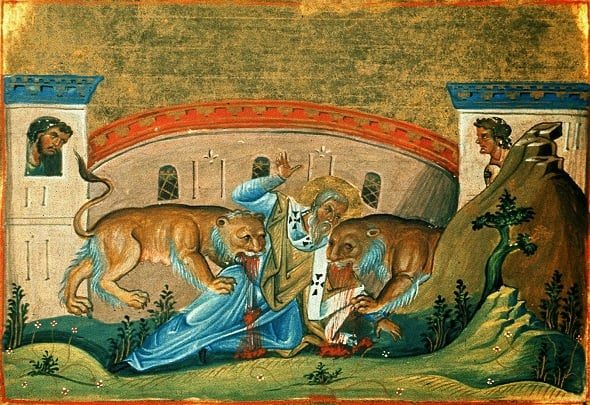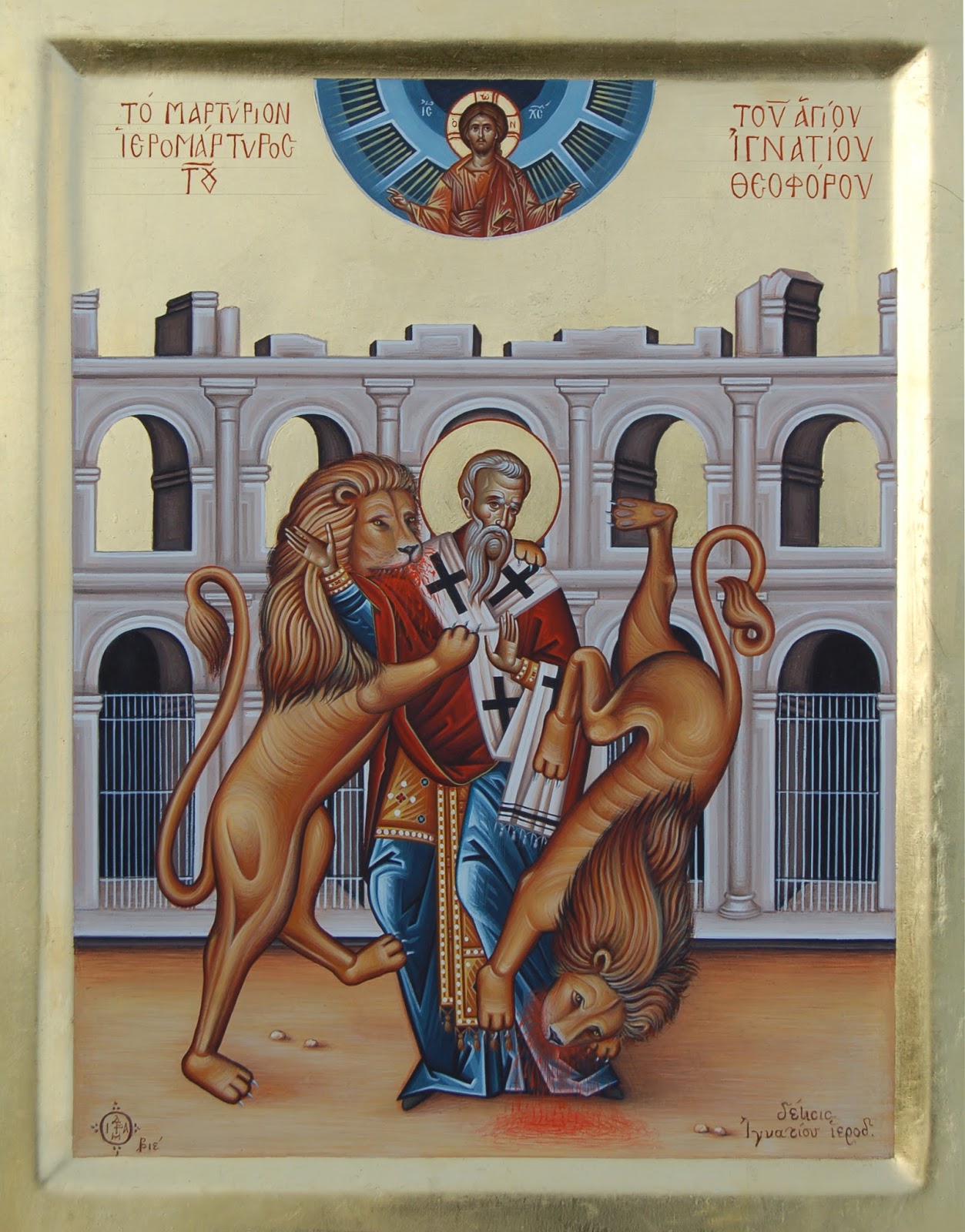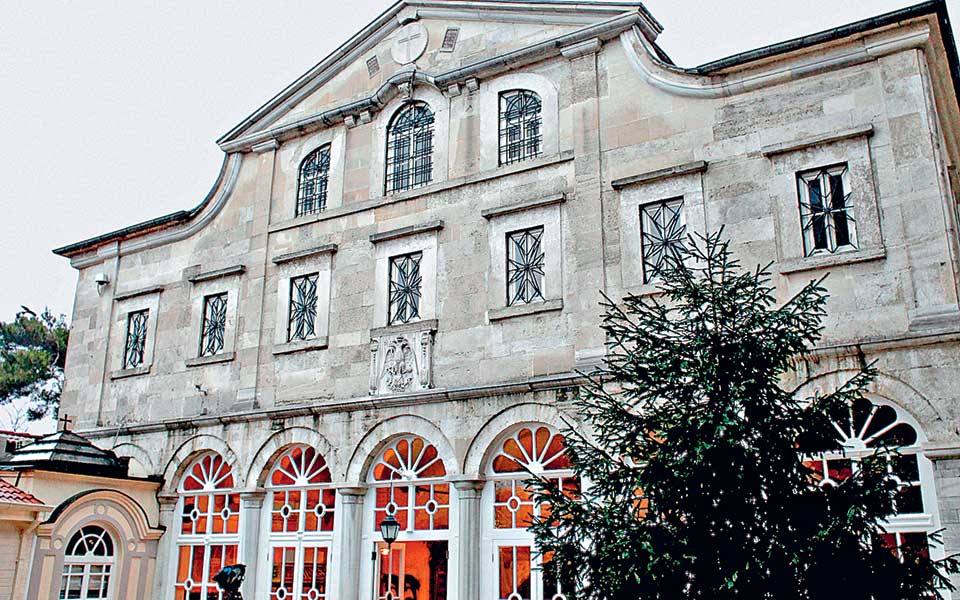Hieromartyr Ignatius the God-Bearer, Bishop of Antioch (20 December)


The Hieromartyr Ignatius the God-Bearer, was a disciple of the holy Apostle and Evangelist John the Theologian, as was also Saint Polycarp, Bishop of Smyrna (February 23). Saint Ignatius was the second bishop of Antioch, and successor to Bishop Euodius, Apostle of the Seventy (September 7).
Tradition suggests that when Saint Ignatius was a little boy, the Savior hugged him and said: “Unless you turn and become as little children, you shall not enter into the Kingdom of Heaven” (Mt. 18:3). The saint was called “God-Bearer” (Theophoros), because he bore God in his heart and prayed unceasingly to Him. He also had this name because he was held in the arms of Christ, the incarnate Son of God.
Saint Ignatius was a disciple of the Apostle John the Theologian, together with Saint Polycarp of Smyrna. As Bishop of Antioch, Saint Ignatius was zealous and spared no effort to build up the church of Christ. To him is attributed the practice of antiphonal singing (by two choirs) during church services. He had seen a vision of the angels in heaven alternately singing praises to God, and divided his church choir to follow this example. In the time of persecution he was a source of strength to the souls of his flock, and was eager to suffer for Christ.
In the year 106 the emperor Trajan (98-117), after his victory over the Scythians, ordered everyone to give thanks to the pagan gods, and to put to death any Christians who refused to worship the idols. In the year 107, Trajan happened to pass through Antioch. Here they told him that Bishop Ignatius openly confessed Christ, and taught people to scorn riches, to lead a virtuous life, and preserve their virginity. Saint Ignatius came voluntarily before the emperor, so as to avert persecution of the Christians in Antioch. Saint Ignatius rejected the persistent requests of the emperor Trajan to sacrifice to the idols. The emperor then decided to send him to Rome to be thrown to the wild beasts. Saint Ignatius joyfully accepted the sentence imposed upon him. His readiness for martyrdom was attested to by eyewitnesses, who accompanied Saint Ignatius from Antioch to Rome.


On the way to Rome, the ship sailed from Seleucia stopped at Smyrna, where Saint Ignatius met with his friend Bishop Polycarp. Clergy and believers from other cities and towns thronged to see Saint Ignatius. He exhorted everyone not to fear death and not to grieve for him. In his Epistle to the Roman Christians, he asked them to assist him with their prayers, and to pray that God would strengthen him in his impending martyrdom for Christ: “I seek Him Who died for us; I desire Him Who rose for our salvation… In me, desire has been nailed to the cross, and no flame of material longing is left. Only the living water speaks within me, saying, ‘Hasten to the Father.’”
From Smyrna, Saint Ignatius went to Troas. Here he heard the happy news of the end of the persecution against Christians in Antioch. From Troas, Saint Ignatius sailed to Neapolis (in Macedonia) and then to Philippi.
On the way to Rome Saint Ignatius visited several churches, teaching and guiding the Christians there. He also wrote seven epistles: to the churches of Ephesus, Magnesia, Tralles, Rome, Philadelphia, and Smyrna. He also addressed a letter to Saint Polycarp, who mentions a collection of the letters of Saint Ignatius in his letter to the Philippians (Ch. 13). Saint Irenaeus of Lyons quotes from Saint Ignatius’s letter to the Romans (AGAINST HERESIES 5:28:4). All these letters have survived to the present day.
The Roman Christians met Saint Ignatius with great joy and profound sorrow. Some of them hoped to prevent his execution, but Saint Ignatius implored them not to do this. Kneeling down, he prayed together with the believers for the Church, for love between the brethren, and for an end to the persecution against Christians.
On December 20, the day of a pagan festival, they led Saint Ignatius into the arena, and he turned to the people: “Men of Rome, you know that I am sentenced to death, not because of any crime, but because of my love for God, by Whose love I am embraced. I long to be with Him, and offer myself to him as a pure loaf, made of fine wheat ground fine by the teeth of wild beasts.”
After this the lions were released and tore him to pieces, leaving only his heart and a few bones. Tradition says that on his way to execution, Saint Ignatius unceasingly repeated the name of Jesus Christ. When they asked him why he was doing this, Saint Ignatius answered that this Name was written in his heart, and that he confessed with his lips Him Whom he always carried within. When the saint was devoured by the lions, his heart was not touched. When they cut open the heart, the pagans saw an inscription in gold letters: “Jesus Christ.” After his execution Saint Ignatius appeared to many of the faithful in their sleep to comfort them, and some saw him at prayer for the city of Rome.
Hearing of the saint’s great courage, Trajan thought well of him and stopped the persecution against the Christians. The relics of Saint Ignatius were transferred to Antioch (January 29), and on February 1, 637 were returned to Rome and placed in the church of San Clemente.
Saint Ignatius was a disciple of Saint John the Theologian, and a successor of the Apostles, and he became the second Bishop of Antioch, after Evodus. He wrote many epistles to the faithful, strengthening them in their confession, and preserving for us the teachings of the holy Apostles. Brought to Rome under Trajan, he was surrendered to lions to be eaten, and so finished the course of martyrdom about the year 107. The remnants of his bones were carefully gathered by the faithful and brought to Antioch. He is called God-bearer, as one who bare God within himself and was aflame in heart with love for Him. Therefore, in his Epistle to the Romans (ch. 4), imploring their love not to attempt to deliver him from his longed-for martyrdom, he said, “I am the wheat of God, and am ground by the teeth of the wild beasts, that I may be found to be the pure bread of God.”
This holy man is called “the God-bearer” because he constantly bore the name of the Living God in his heart and on his lips. According to tradition, he was thus named because he was held in the arms of God Incarnate, Jesus Christ. On a day when the Lord was teaching His disciples humility, He took a child and placed him among them, saying: Whosoever therefore shall humble himself as this little child, the same is greatest in the Kingdom of Heaven (Matthew 18:4). This child was Ignatius. Later, Ignatius was a disciple of St. John the Theologian, together with Polycarp, Bishop of Smyrna.
As Bishop of Antioch, Ignatius governed the Church of God as a good shepherd and was the first to introduce antiphonal chanting in the Church, in which two choirs alternate the chanting. This manner of chanting was revealed to St. Ignatius by the angels in heaven. When Emperor Trajan was passing through Antioch on his way to do battle with the Persians, he heard of Ignatius, summoned him and counseled him to offer sacrifice to the idols. If Ignatius would do so, Trajan would bestow upon him the rank of senator. As the counsels and threats of the emperor were in vain, St. Ignatius was shackled in irons and sent to Rome in the company of ten merciless soldiers, to be thrown to the wild beasts.
Ignatius rejoiced in suffering for his Lord, only praying to God that the wild beasts would become the tomb for his body and that no one would prevent him from this death. After a long and difficult journey from Asia through Thrace, Macedonia and Epirus, Ignatius arrived in Rome, where he was thrown to the lions in the circus. The lions tore him to pieces and devoured him, leaving only several of the larger bones and his heart. This glorious lover of the Lord Christ suffered in the year 106 A.D. in Rome at the time of the Christ-hating Emperor Trajan. Ignatius has appeared many times from the other world and worked miracles, even to this day helping all who call upon him for help.
Apolytikion of Ignatius the God-Bearer
Fourth Tone
As a sharer of the ways and a successor to the throne of the Apostles, O inspired of God, thou foundest discipline to be a means of ascent to divine vision. Wherefore, having rightly divided the word of truth, thou didst also contest for the Faith even unto blood, O Hieromartyr Ignatius. Intercede with Christ our God that our souls be saved.
Kontakion of Ignatius the God-Bearer
Third Tone
The divine and brilliant day of thine illustrious contests doth proclaim to all mankind Him that was born of a Virgin; for it was for Him that thou didst thirst to delight in, and didst haste to be devoured by beasts in thy longing. Hence, O glorious Ignatius, the name God-bearer was rightly given to thee.
Source: oca.org / goarch.org / westserbdio.org




